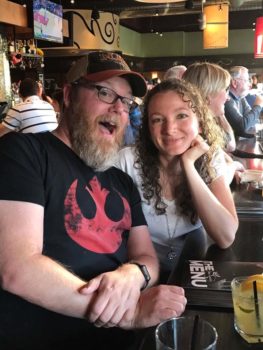A couple of weeks ago, I got the great opportunity to attend, and teach at, the Northern Colorado Writer’s Conference. It was my first time there and I was really impressed by what a great conference it was–intimate and slower paced, which allowed for more time to get to know other attendees and have more in-depth conversations. In these conversations and in the workshops presented (including my own) there was a topic that seemed to keep coming up:
Let your writing process be your own.
It’s a simple piece of advice, and one we already know, but in the midst of trying to get published, trying to be a productive writer, and definitely in the midst of a writer’s conference when you’re looking for “the answers” it can be easy to forget.
Perspective on Advice from Other Writers

I think it’s normal to look up to other writers who have “done it” and want to know their secrets. Thanks to the internet, social media, and the many writing craft books out there, there’s certainly no shortage of opinions and insights out there, most of which is conflicting.
But there’s a very good reason why it conflicts–because what works for one writer, may not work for another. Maybe not any other writer.
For instance, when I was presenting my workshop on writing productivity, and spoke about writing process, an attendee reminded me that many authors swear by the technique of stopping a writing session mid-sentence so they have a place to jump right back into in the next writing session. I get the point of the idea–to never have a blank page staring you in the face–and no doubt it works well for those authors. I’ve given it a try myself, but it never really worked for me. I’m the kind of writer who needs to get everything in my head written down ASAP lest I lose it, or it morphs into something else entirely, so this technique never worked well for me. I’d come back to the page frustrated that the great piece of dialogue I had in mind had disappeared, or that I’d lost my train of thought all together. And when I expressed that point-of-view in my workshop, many other writers in the room nodded that they’d had the similar experiences, while others were still excited to give the technique a try.
Our writing processes are simply different. And there’s no “right” way. There’s only the way that’s right for you right now.
Discovering Your Own Writing Process
When I first started writing, and I spent so much time trying to write other people’s way, I would get so frustrated and beat myself up constantly for “failing.”
If this author writes thousands of words a day with this technique, why can I not even get myself to the page? Why is it that I say writing is what I’m meant to do, yet the process of actually doing it is so painful? Something is clearly wrong with me.
Sound familiar? But here’s the thing: there’s a reason why that author is so productive with that technique–because it’s exactly the right technique for them. And it was when I stopped expecting that I should be able to do it someone else’s way, that I finally found the right process for me.
Here’s what advice from other author’s is great for, though: ideas. Use their advice as a jumping point to come up with a process that is exactly right for you.
So what if you haven’t discovered your own process yet? Here are some ideas to try:
TEST OUT DIFFERENT TECHNIQUES.
Other writers’ advice might not be right for you, but it isn’t inherently wrong either. The only way to find out is to give it a shot! Try stopping mid-sentence. Try writing 5,000 words a day. Try National Novel Writing Month. Try writing 100 words for 100 days. Trying throwing all deadlines and expectations out the window! See what works. See what feels right, no pressure. You’ll know you’ve found the right process for you when you’re excited about your writing and you feel like you can breathe.
TRACK YOUR WRITING LIFE.
Sometimes it can be hard to tell what’s working and what isn’t. Be a scientist of your writing process. Note as much as you can as you try different techniques, including the time of day, how long you worked for, what you accomplished, how you feel about that, etc. The more and longer you track, the easier it will be to see trends and adjust accordingly. (Here’s one tool you can use to track.)
BE OPEN TO THE IDEA THAT IT CAN CHANGE.
You are an ever-evolving being so if what has worked for you in the past isn’t working anymore, let it go. Don’t hold on for dear life, thinking it’s the only way. It isn’t. And when you let go of the old way, you give yourself the freedom to discover your new way.
JOURNAL ABOUT IT.
It’s amazing how much your subconscious knows, which you can tap into any time by putting pen to the page. (Yes, handwriting works better for this!) The truth is, you already have all the answers inside you, if you’re trusting enough to ask and brave enough to listen.
I know it’s hard to let go of the belief that somebody else has it more figured out than you do, but tell me this: how is that working out for you? Are you happy with your progress? Is your writing life stressing you out? Do you feel like getting to the page each day is a battle you’re constantly losing?
Maybe it’s time to try a different way. Maybe it’s time to try your way.




[…] the years, I have been an eager examiner of what works and what does not work for me when it comes to writing and my business. For instance, I know I don’t do well when I’m […]